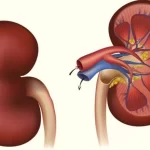How can diabetes harm the kidney?
Friends today we know about Diabetic Kidney Disease. Normally, 1200 milliliters of blood is purified in the kidney every minute. Due to diabetes not being under control, the amount of blood flowing through the kidney increases up to 40 percent, which causes the kidney to labor more, which is harmful.
If the kidney has suffered similar damage for a long time, the blood pressure increases and the kidney may also be harmed. Diabetes is the cause of kidney failure in every three patients undergoing dialysis.
Along with this, the burden on the kidney worsening the high blood pressure makes the kidney more vulnerable. Beginning with this kidney damage – protein begins to pass in urine, which is the first sign of serious kidney disease in the future.
After this, the release of water and alkali from the body becomes less than necessary, as a result, the body starts swelling, (bodyweight starts to increase) and blood pressure starts to increase. In the case of more damage to the kidney, the function of purification of the kidney starts decreasing and the amount of creatinine and urea in the blood starts increasing. This time a blood test is used to diagnose chronic kidney disease.
Some symptoms of Diabetic Kidney Disease
- Gradually the blood pressure increases and at the same time swelling of the feet and face starts.
- The amount of medicine or insulin required for diabetes starts decreasing gradually. Diabetes is well controlled by taking the same amount that was previously not under control.
- In many patients, diabetes remains under control without taking diabetes medicines. Many such patients feel proud and happy thinking that diabetes is over, but it can actually be a worrying sign of kidney disease.
- In the early stage, no symptoms of kidney disease are seen. Detection of albumin in the urine test is the first sign of serious kidney disease.
- Due to kidney failure, the amount of creatinine and urea in the blood starts increasing.
- Some symptoms of chronic kidney disease – such as weakness, fatigue, nausea, loss of appetite, vomiting, itching, yellowing, and shortness of breath are all seen in the later stages of kidney disease.
How can the effect of Diabetic Kidney Disease be prevented?
- Restrict the intake of sugar and salt. Keep the amount of protein, inhabited and cholesterol in the food to a minimum.
- Limit the level of HbA1C to good blood sugar control ie 7%.
- Make sure to test urine for albumin testing, a blood test for creatinine test, and eGFR test once a year so that your kidney can be fully tested. Exercise regularly and maintain your ideal weight.
- Other suggestions – Stop smoking tobacco, gutkha, betel leaf, beedi, cigarette and alcohol (alcohol).
- Control diabetes and high blood pressure and get proper screening for early diagnosis.
When should a patient with diabetic kidney disease contact a doctor?
- Recurrent hypoglycemia, ie, extremely low blood sugar levels.
- Extreme weakness, loss of appetite, vomiting and pale body.
- Unexpected weight gain, a significant decrease in urine volume, increased swelling of face and feet, or shortness of breath.
- Decreased need for insulin or diabetes medicines.
- Chest pain, increased pre-existing high blood pressure, abnormalities in heart rate.
- Constant fever, chills, burning or pain during urination, blood in urine or pus in the urine.
Treatment of diabetes effect on kidney
- Always maintain proper control over diabetes. It is necessary to make necessary changes in diabetes medicine after kidney disease. After kidney disease, necessary changes in diabetes medicine should be done only on the basis of the report of a blood sugar test. The drug should not be changed based on reports of sugar in the urine only.
- For diabetics, long-term short-acting drugs are preferred. Doctors prefer to use insulin in most patients for a lot of control. Medications known as biguanides (metformin) are discontinued as they are dangerous for patients with kidney disease.
- The risk of heart disease in the patient of this disease is also very high. Critically evaluate the causes that pose any risk to the heart. Such as smoking, high blood sugar, high blood sugar, increased blood fat levels, etc.
- To keep high blood pressure under control forever, blood pressure should be measured and written down daily. Blood pressure should not be increased by more than 130/80 It is the most important treatment to keep kidney function stable.
- The group of drugs (A. C. E. I.) And (A. R. B.) are used early in the disease. This medicine helps in reducing the damage to the kidney as well as lowering the blood pressure.
- When the kidneys stop functioning completely, then despite taking the medicine, the patient’s discomfort increases. In this condition, dialysis or kidney transplant is required.
- To reduce inflammation, it is advisable to take diuretics medicine and eat less salt and water.





